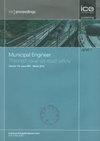A planning support system for boosting walkability
IF 0.8
4区 工程技术
Q4 ENGINEERING, CIVIL
Proceedings of the Institution of Civil Engineers-Municipal Engineer
Pub Date : 2023-12-28
DOI:10.1680/jmuen.23.00040
引用次数: 0
Abstract
This study introduces a Walkability Planning Support System (W-PSS), a novel framework designed to revolutionize urban walkability within the 15-minute city concept. The W-PSS stands out for its approach that develops a new walkability index, underscores pertinent explanatory variables, and introduces a methodology for sculpting diverse walkability scenarios using the Multiscale Geographical Weighted Regression model which achieved an adjusted R-squared of 67.3%. Central to the findings is the significant role of employment density in enhancing walkability, and the nuanced interplay between commercial and population densities. A particularly insightful revelation is the unexpected negative correlation between cycling and walkability, emphasizing the need for a meticulous strategy to avoid cyclist-pedestrian conflict by harmoniously integrating and balancing both modes. Additionally, while cities with robust public transit showed limited room for enhancement, safety, and green space emerged as opportunities for refinement. Conclusively, informed by these insights, this research furnishes tailored scenarios and policy recommendations to foster enhanced walkability in urban landscapes. While the W-PSS framework offers a universal planning support system model for assessing and improving walkability, the study acknowledges that the concluded insights and implications vary based on each city's unique characteristics. Therefore, the application and the interpretation of results should be tailored.提高步行能力的规划支持系统
本研究介绍了步行能力规划支持系统(W-PSS),这是一个新颖的框架,旨在彻底改变 15 分钟城市概念中的城市步行能力。W-PSS 的突出之处在于它开发了一种新的步行能力指数,强调了相关的解释变量,并引入了一种方法,利用多尺度地理加权回归模型设计出多种步行能力方案,调整后的 R 平方达到 67.3%。研究结果的核心是就业密度在提高步行能力方面的重要作用,以及商业密度和人口密度之间微妙的相互作用。一个特别有洞察力的启示是,自行车与步行适宜性之间存在意想不到的负相关关系,这强调了通过和谐整合和平衡两种交通方式来避免自行车与行人冲突的缜密策略的必要性。此外,虽然公共交通发达的城市显示出有限的提升空间,但安全和绿地成为了改进的机会。最后,根据这些见解,本研究提供了量身定制的方案和政策建议,以促进城市景观中步行宜居性的提高。虽然 W-PSS 框架为评估和改善步行适宜性提供了一个通用的规划支持系统模型,但本研究承认,根据每个城市的独特性,得出的见解和影响也各不相同。因此,对结果的应用和解释应量体裁衣。
本文章由计算机程序翻译,如有差异,请以英文原文为准。
求助全文
约1分钟内获得全文
求助全文
来源期刊
CiteScore
3.70
自引率
0.00%
发文量
15
审稿时长
>12 weeks
期刊介绍:
Municipal Engineer publishes international peer reviewed research, best practice, case study and project papers reports. The journal proudly enjoys an international readership and actively encourages international Panel members and authors. The journal covers the effect of civil engineering on local community such as technical issues, political interface and community participation, the sustainability agenda, cultural context, and the key dimensions of procurement, management and finance. This also includes public services, utilities, and transport. Research needs to be transferable and of interest to a wide international audience. Please ensure that municipal aspects are considered in all submissions. We are happy to consider research papers/reviews/briefing articles.

 求助内容:
求助内容: 应助结果提醒方式:
应助结果提醒方式:


